|
|
|
Sort Order |
|
|
|
Items / Page
|
|
|
|
|
|
|
| Srl | Item |
| 1 |
ID:
157785
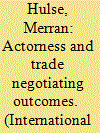

|
|
|
|
|
| Summary/Abstract |
In 2014, the EU concluded Economic Partnership Agreements (EPAs) with several African, Caribbean and Pacific (ACP) regions. These EPAs represent some of the most advanced examples of interregional cooperation. Yet, the outcomes of EPA negotiations are not the same across all regions. This article investigates differences in negotiated outcomes and argues that regional actorness – the ability of regions to become identifiable, to aggregate the interests of member states, to formulate collective goals and to make and implement decisions – influences regions’ ability to navigate interregional trade negotiations. In a comparison of the actorness and negotiated outcomes of West Africa and the SADC EPA Group, the article shows that actorness matters for international negotiations: regions with higher levels of actorness can negotiate better outcomes even under conditions of stark power asymmetry.
|
|
|
|
|
|
|
|
|
|
|
|
|
|
|
|
| 2 |
ID:
157788
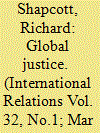

|
|
|
|
|
| Summary/Abstract |
This article argues that global egalitarian accounts of global justice are insufficient and inappropriate to the task of thinking globally about justice. This article argues that the most pervasive approaches to cosmopolitanism, and in particular global egalitarian accounts, are of limited utility because they assume the existence of suitable preconditions which are absent, in particular the lack of a global reflective equilibrium. In so doing, they ignore the requisite precondition for their own thought to be either persuasive or possible as a basis for genuine conduct or institutional reform. This article argues that the task for cosmopolitan thought is to think about how cosmopolitanism can in the words of Richard Rorty be ‘shaped rather than found’ and what that would mean for how we construct accounts of global justice and other pressing cosmopolitan issues. It concludes that developing a theory of global justice requires at least a theoretical engagement with non-Western political thought.
|
|
|
|
|
|
|
|
|
|
|
|
|
|
|
|
| 3 |
ID:
157787
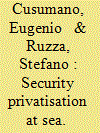

|
|
|
|
|
| Summary/Abstract |
In 2011, the growing number of pirate attacks prompted several flag states to authorise the use of armed guards aboard vessels. Despite facing the same threat, the United Kingdom, the Netherlands and Italy have adopted three distinct approaches to securing their merchant ships, ranging from the exclusive use of private security companies (PSCs) to the employment of military personnel only. This article conducts a congruence testing of the main theoretical explanations for the use of PSCs on land against UK, Dutch and Italian vessel protection policies. By relying on sequencing as a technique for theoretical synthesis, we develop a multicausal explanation of states’ vessel protection arrangements, showing the varying influence of functionalist, ideational, organisational and political drivers of security privatisation at different phases of the policy process.
|
|
|
|
|
|
|
|
|
|
|
|
|
|
|
|
| 4 |
ID:
157784
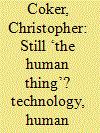

|
|
|
|
|
| Summary/Abstract |
Is war beginning to escape human control? Thucydides tells us the war is one of the things that makes us definitively human; but how long will this continue to be the case as our relationship with technology continues to develop? Kenneth Waltz’s book Man, the State and War affords one way of answering that question. So too does Nikolaas Tinbergen’s framework for understanding human behaviour and Bruno Latour’s Actor–Network Theory (ANT). The main focus of this article is the extent to which we will diminish or enhance our own agency as human beings, especially when we come to share the planet with an intelligence higher than our own.
|
|
|
|
|
|
|
|
|
|
|
|
|
|
|
|
| 5 |
ID:
157786
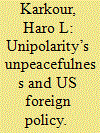

|
|
|
|
|
| Summary/Abstract |
Drawing on Hans J. Morgenthau, this article argues that a key contributor to the unpeacefulness of the post–Cold War unipolar order was the irrationality of US foreign policy. Post–Cold War US foreign policy was irrational in that it failed to base its strategy on the prudent evaluation of the empirical facts in the social and political context in which it was formulated. Instead, it reinterpreted reality in terms of a simplistic picture of the world as accepted by US policymakers a priori, and sought the use of military force as the sole national security strategy to impose the inviolability of the ideals entailed in this picture. This turned post–Cold War US foreign policy into a self-contradictory endeavour as far as the results were concerned: not only did it confuse desirable for essential interests in standardising the enemy – whether Milosevic, Saddam or Qaddafi – to fit the a priori categorisation, but it also opened a gap between the desirable and the possible. For one thing such an irrational post–Cold War US foreign policy failed to accommodate or annul was the empirical reality of conflicting interests in the social and political contexts upon which it sought to impose its a priori picture. This resulted in consequences that were untenable from the standpoint of US objectives and international peace and security, contributing, overall, to the unpeacefulness of the post–Cold War unipolar order.
|
|
|
|
|
|
|
|
|
|
|
|
|
|
|
|
| 6 |
ID:
157783
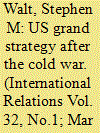

|
|
|
|
|
| Summary/Abstract |
This article uses realism to explain past US grand strategy and prescribe what it should be today. Throughout its history, the United States has generally acted as realism depicts. The end of the Cold War reduced the structural constraints that states normally face in anarchy, and a bipartisan coalition of foreign policy elites attempted to use this favorable position to expand the US-led ‘liberal world order’. Their efforts mostly failed, however, and the United States should now return to a more realistic strategy – offshore balancing – that served it well in the past. Washington should rely on local allies to uphold the balance of power in Europe and the Middle East and focus on leading a balancing coalition in Asia. Unfortunately, President Donald Trump lacks the knowledge, competence, and character to pursue this sensible course, and his cavalier approach to foreign policy is likely to damage America’s international position significantly.
|
|
|
|
|
|
|
|
|
|
|
|
|
|
|
|
|
|
|
|
|